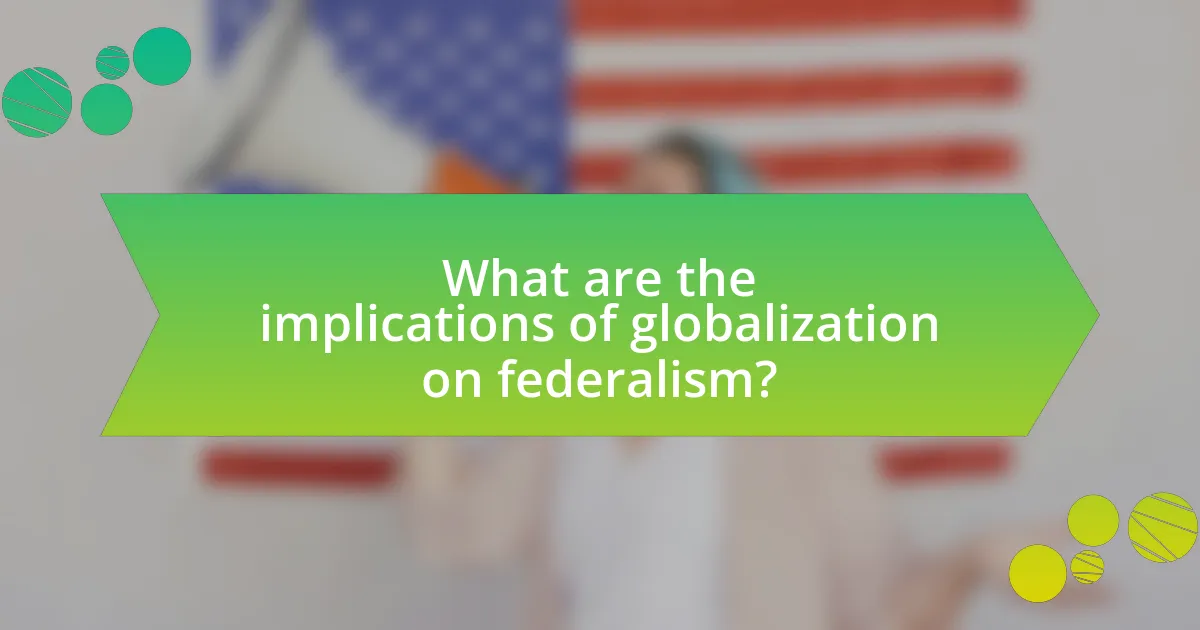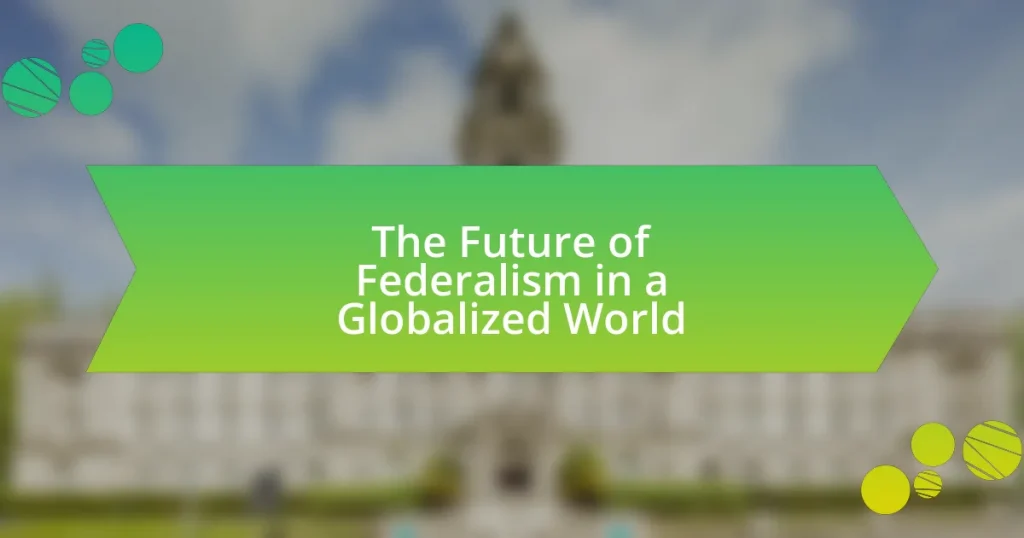The article examines the future of federalism in the context of globalization, highlighting the evolving power dynamics between national and subnational governments. It defines federalism as a governance system that balances local autonomy with national unity, emphasizing the need for cooperation to address transnational challenges such as climate change and economic inequality. Key characteristics of federalism, including the division of powers and the influence of globalization on these dynamics, are discussed, along with the implications for social equity and justice. The article also explores strategies for enhancing federalism, the role of technology, and the importance of citizen engagement in shaping governance structures.

What is the Future of Federalism in a Globalized World?
The future of federalism in a globalized world is likely to involve a reconfiguration of power dynamics between national and subnational governments. As globalization increases interdependence among nations, federal systems may adapt by enhancing cooperation and coordination across borders, addressing transnational issues such as climate change, trade, and migration. For instance, the European Union exemplifies how federal structures can evolve to manage shared challenges while maintaining regional autonomy. Additionally, the rise of global governance frameworks suggests that federal entities will need to balance local interests with international obligations, leading to more collaborative policymaking. This evolution reflects the necessity for federal systems to remain relevant and effective in addressing complex global challenges.
How is federalism defined in the context of globalization?
Federalism in the context of globalization is defined as a system of governance where power is divided between a central authority and regional entities, allowing for both local autonomy and national unity in an increasingly interconnected world. This definition highlights the dual nature of federalism, which must adapt to the pressures of globalization, such as economic interdependence and cultural exchange, while maintaining the integrity of local governance. The necessity for federal systems to respond to global challenges, like climate change and international trade, illustrates the evolving nature of federalism, as seen in countries like Germany and Canada, where regional governments play significant roles in addressing global issues while still operating within a federal framework.
What are the key characteristics of federalism?
Federalism is characterized by the division of powers between a central authority and constituent political units, such as states or provinces. This system allows for multiple levels of government, each with its own jurisdiction and responsibilities, which can enhance local governance and accommodate regional diversity. For instance, in the United States, the Constitution delineates powers between the federal government and the states, ensuring that both levels can operate independently within their respective domains. This structure promotes a balance of power, enabling local governments to address specific needs while the central government manages national issues.
How does globalization influence these characteristics?
Globalization influences the characteristics of federalism by promoting interdependence among states, leading to shared governance and policy alignment. As nations become more interconnected through trade, communication, and cultural exchange, federal systems adapt to accommodate transnational issues such as climate change, economic inequality, and migration. For instance, the European Union exemplifies how globalization necessitates collaborative frameworks that transcend national borders, resulting in harmonized regulations and joint initiatives. This shift reflects a growing recognition that local governance must integrate global perspectives to effectively address complex challenges, thereby reshaping the traditional dynamics of federalism.
Why is the future of federalism important in a globalized world?
The future of federalism is important in a globalized world because it enables diverse regions to maintain autonomy while addressing transnational challenges. Federalism allows for localized governance that can adapt to specific cultural, economic, and social needs, which is crucial as globalization increases interdependence among nations. For instance, the European Union exemplifies how federal structures can facilitate cooperation on issues like trade, environmental policy, and security, while still respecting member states’ sovereignty. This balance is essential for fostering stability and resilience in an interconnected global landscape.
What challenges does globalization pose to federal systems?
Globalization poses significant challenges to federal systems by undermining the autonomy of subnational governments. As global economic integration increases, federal entities often face pressure to conform to international standards and policies, which can limit their ability to legislate independently. For instance, trade agreements may require states to align their regulations with global norms, reducing local control over economic policies. Additionally, globalization can exacerbate inequalities between regions, as wealth and resources may concentrate in more competitive areas, leading to disparities in governance and public service delivery. This dynamic can create tensions between federal and state authorities, as local governments struggle to address the unique needs of their constituents while adhering to overarching global frameworks.
How can federalism adapt to these challenges?
Federalism can adapt to challenges by enhancing cooperation between different levels of government and integrating technology for better governance. This adaptation involves establishing frameworks for intergovernmental collaboration, which can lead to more efficient resource allocation and policy implementation. For instance, countries like Germany and Canada have successfully utilized intergovernmental agreements to address issues such as climate change and public health, demonstrating that coordinated efforts can yield effective solutions. Additionally, leveraging technology, such as data-sharing platforms, can improve communication and responsiveness among federal and state governments, allowing for quicker adaptation to emerging challenges.
What are the potential scenarios for federalism in the future?
Potential scenarios for federalism in the future include increased decentralization, where regional governments gain more autonomy, and enhanced centralization, where national governments assert greater control over local entities. Decentralization may arise from demands for local governance and cultural recognition, as seen in regions like Catalonia in Spain, where movements for independence have gained traction. Conversely, centralization could be driven by global challenges such as climate change and economic crises, necessitating coordinated responses that require stronger national frameworks, as evidenced by the European Union’s efforts to unify member states in response to economic instability. These scenarios reflect the dynamic interplay between local aspirations and global pressures, shaping the evolution of federal systems.
How might federalism evolve in response to global governance trends?
Federalism may evolve by increasing the collaboration between national and subnational governments to address global challenges. As global governance trends emphasize transnational issues such as climate change, public health, and economic inequality, federal systems may adapt by enhancing intergovernmental cooperation and creating frameworks for shared decision-making. For instance, the Paris Agreement has prompted federal states to align their environmental policies with international commitments, demonstrating a shift towards more integrated governance structures. This evolution reflects the necessity for federal systems to remain relevant and effective in a world where local actions increasingly have global implications.
What role will technology play in shaping federalism?
Technology will play a transformative role in shaping federalism by enhancing communication, data sharing, and governance efficiency among different levels of government. The integration of digital platforms allows for real-time collaboration and decision-making, which can lead to more responsive and accountable governance. For instance, the use of blockchain technology in public administration can increase transparency and reduce corruption, as evidenced by pilot projects in various countries that have successfully implemented blockchain for voting and land registration. Additionally, advancements in artificial intelligence can facilitate better resource allocation and policy formulation by analyzing vast amounts of data, thereby improving the overall effectiveness of federal systems.

What are the implications of globalization on federalism?
Globalization significantly impacts federalism by shifting power dynamics between national and subnational governments. As global economic integration increases, federal systems often face pressure to align local policies with international standards, which can undermine local autonomy. For instance, trade agreements and international regulations may compel states to conform to external economic policies, limiting their legislative independence. Additionally, globalization fosters transnational networks that can bypass traditional federal structures, leading to a dilution of state authority. This phenomenon is evident in the European Union, where member states have ceded certain powers to supranational institutions, illustrating how globalization can reshape federal relationships and governance structures.
How does globalization affect the distribution of power in federal systems?
Globalization redistributes power in federal systems by enhancing the influence of supranational entities and diminishing the autonomy of local governments. As countries engage in international trade and treaties, they often cede some decision-making authority to global institutions, which can lead to a centralization of power at the national level. For instance, the European Union exemplifies this trend, where member states have transferred certain powers to EU institutions, impacting local governance and policy-making. Additionally, globalization can exacerbate inequalities among regions, as economically stronger areas attract more investment and resources, further shifting power dynamics within federal systems.
What are the impacts on state versus federal authority?
The impacts on state versus federal authority include shifts in power dynamics, where federal authority often supersedes state authority in areas such as immigration, healthcare, and environmental regulations. This trend is evidenced by the Supreme Court’s rulings, such as in the case of Gonzales v. Raich (2005), which affirmed federal power over state laws regarding marijuana use, illustrating the precedence of federal law in certain contexts. Additionally, federal funding mechanisms can incentivize states to align with federal policies, further consolidating federal authority.
How do international agreements influence federal governance?
International agreements significantly influence federal governance by establishing binding commitments that shape domestic policies and legal frameworks. These agreements often require federal governments to align national laws with international standards, impacting areas such as trade, environmental regulations, and human rights. For instance, the North American Free Trade Agreement (NAFTA) necessitated changes in U.S. trade policies, leading to the modification of tariffs and trade regulations to comply with the agreement’s stipulations. Additionally, international treaties like the Paris Agreement compel federal governments to implement specific climate action plans, thereby altering governance structures to meet global environmental goals. Such influences demonstrate how international agreements can drive federal governance towards greater compliance with global norms and standards.
What are the social implications of federalism in a globalized context?
Federalism in a globalized context leads to increased regional autonomy and diversity in governance, which can enhance social cohesion and local identity. This structure allows regions to tailor policies to their specific cultural and social needs, fostering a sense of belonging among citizens. For instance, countries like Canada and Switzerland demonstrate how federalism accommodates linguistic and cultural differences, promoting social stability. Additionally, federalism can facilitate better responses to global challenges, such as climate change, by enabling localized solutions that reflect community values and priorities. This adaptability is crucial in a globalized world where uniform policies may not address local issues effectively.
How does globalization affect cultural identities within federal systems?
Globalization significantly influences cultural identities within federal systems by promoting cultural exchange and integration while simultaneously challenging local traditions. As federal systems often encompass diverse cultural groups, globalization facilitates the dissemination of global cultural norms, leading to a blending of local and international identities. For instance, the rise of digital communication allows for the rapid spread of cultural products, such as music and fashion, which can overshadow indigenous practices. Research indicates that in countries like Canada and India, globalization has led to both the enrichment of cultural diversity and the risk of cultural homogenization, as seen in the adoption of Western lifestyles among younger populations. This dual effect underscores the complexity of cultural identity formation in federal systems amidst global influences.
What are the implications for social equity and justice?
The implications for social equity and justice in the context of federalism in a globalized world include the potential for increased disparities in resource distribution and access to services. As globalization fosters economic interdependence, regions may experience unequal benefits, leading to marginalized communities facing systemic inequities. For instance, a study by the International Monetary Fund in 2020 highlighted that globalization can exacerbate income inequality, particularly in developing nations, where wealth concentration often occurs in urban centers, leaving rural areas underserved. This uneven development challenges the principles of social equity and justice, necessitating policy interventions that promote inclusive growth and equitable resource allocation across all regions.

What strategies can enhance federalism in a globalized world?
Strategies that can enhance federalism in a globalized world include promoting intergovernmental cooperation, strengthening local governance, and fostering citizen engagement. Intergovernmental cooperation can be achieved through formal agreements and collaborative frameworks that allow different levels of government to address transnational issues effectively, as seen in the European Union’s multi-level governance system. Strengthening local governance empowers regional authorities to make decisions that reflect local needs, which can lead to more responsive and adaptive governance structures. Fostering citizen engagement through participatory processes ensures that the voices of diverse populations are heard, enhancing democratic legitimacy and accountability. These strategies collectively support a more resilient federal system capable of navigating the complexities of globalization.
How can federal systems promote cooperation among states?
Federal systems promote cooperation among states by establishing frameworks for intergovernmental collaboration and resource sharing. These frameworks often include mechanisms such as compacts, joint agencies, and coordinated policy initiatives that facilitate communication and collaboration on shared issues like transportation, environmental protection, and public health. For instance, the U.S. Interstate Compact system allows states to enter agreements for mutual benefit, exemplifying how federalism can enhance cooperative governance. Additionally, federal systems often provide financial incentives for states to work together, such as grants for regional projects, which further encourages collaborative efforts.
What frameworks exist for intergovernmental collaboration?
Several frameworks exist for intergovernmental collaboration, including the Intergovernmental Panel on Climate Change (IPCC), the United Nations (UN) system, and regional organizations like the European Union (EU). The IPCC facilitates collaboration among governments to address climate change through scientific assessments and policy recommendations. The UN system provides a platform for member states to collaborate on global issues, including peace, security, and development. The EU exemplifies regional intergovernmental collaboration, enabling member states to work together on economic, social, and environmental policies. These frameworks demonstrate structured approaches to cooperation among governments, enhancing collective action on shared challenges.
How can best practices be shared across federal systems?
Best practices can be shared across federal systems through collaborative platforms and intergovernmental networks that facilitate communication and knowledge exchange. These platforms, such as the Federal Interagency Council on Statistical Policy, enable agencies to share successful strategies and methodologies, thereby enhancing efficiency and effectiveness. Evidence of this approach’s success can be seen in initiatives like the U.S. Digital Service, which promotes the adoption of digital best practices across various federal agencies, leading to improved service delivery and user experience.
What role do citizens play in shaping the future of federalism?
Citizens play a crucial role in shaping the future of federalism by actively participating in democratic processes and advocating for their interests. Their engagement through voting, public discourse, and civic activism influences policy decisions and the distribution of power between national and regional governments. For instance, citizen movements have historically led to significant reforms in federal structures, such as the civil rights movement in the United States, which prompted changes in federal policies to ensure equal rights across states. This active involvement ensures that federalism evolves to reflect the diverse needs and values of the population, thereby reinforcing the democratic foundation of governance.
How can civic engagement influence federal policies?
Civic engagement can influence federal policies by mobilizing public opinion and encouraging participation in the democratic process. When citizens actively engage through voting, advocacy, or community organizing, they can shape the priorities and decisions of federal lawmakers. For instance, the 2018 midterm elections in the United States saw a significant increase in voter turnout, particularly among young people, which led to a shift in congressional representation and policy focus on issues like climate change and healthcare. This demonstrates that when citizens are engaged, they can directly impact the legislative agenda and hold elected officials accountable, thereby reinforcing the importance of civic participation in shaping federal policies.
What mechanisms exist for public participation in federal decision-making?
Public participation in federal decision-making is facilitated through mechanisms such as public comment periods, advisory committees, and participatory budgeting. Public comment periods allow citizens to provide feedback on proposed regulations and policies, ensuring that their voices are heard in the decision-making process. Advisory committees, composed of stakeholders and experts, offer recommendations and insights to federal agencies, enhancing transparency and inclusivity. Participatory budgeting enables citizens to have a direct say in how federal funds are allocated, fostering engagement and accountability. These mechanisms are essential for promoting democratic governance and ensuring that federal decisions reflect the interests and needs of the public.
What are the best practices for adapting federalism to globalization?
The best practices for adapting federalism to globalization include enhancing intergovernmental cooperation, promoting policy harmonization, and fostering local governance. Intergovernmental cooperation allows different levels of government to work together effectively, addressing transnational issues such as climate change and trade. For instance, the European Union exemplifies this through its multi-level governance structure, which facilitates collaboration among member states.
Policy harmonization ensures that regulations across jurisdictions are aligned, reducing barriers to trade and investment. Countries like Canada and Australia have implemented frameworks that encourage consistency in regulations, which aids in economic integration.
Fostering local governance empowers regional and local authorities to respond to globalization’s challenges more effectively, as they are often closer to the issues at hand. The decentralization of powers in countries such as Germany has allowed local governments to tailor responses to globalization while maintaining national coherence. These practices collectively enhance the adaptability of federal systems in a globalized context.
How can federal systems remain resilient in the face of global challenges?
Federal systems can remain resilient in the face of global challenges by enhancing intergovernmental cooperation, fostering adaptive governance, and promoting local autonomy. Intergovernmental cooperation allows for the sharing of resources and best practices, which can lead to more effective responses to crises, as seen in the collaborative efforts during the COVID-19 pandemic where states and federal entities worked together to manage public health responses. Adaptive governance enables federal systems to respond swiftly to changing global dynamics, as evidenced by countries that have successfully implemented flexible policy frameworks to address climate change and economic shifts. Additionally, promoting local autonomy empowers regional governments to tailor solutions to their specific contexts, enhancing overall system resilience, as demonstrated in federal systems like Germany, where states have significant authority to address local issues effectively.
What lessons can be learned from successful federal systems worldwide?
Successful federal systems worldwide demonstrate the importance of balancing power between national and regional governments to enhance governance and representation. For instance, Switzerland’s federal structure allows cantons significant autonomy, fostering local decision-making that reflects diverse regional needs. This decentralization promotes accountability and responsiveness, as seen in Canada, where provinces have the authority to tailor policies to their populations, leading to effective public services. Additionally, successful federal systems emphasize the need for clear constitutional frameworks that delineate responsibilities, as evidenced by Germany’s Basic Law, which provides a stable foundation for federal-state relations. These examples illustrate that effective federalism requires a commitment to cooperation, respect for regional diversity, and a robust legal framework to ensure stability and adaptability in governance.






